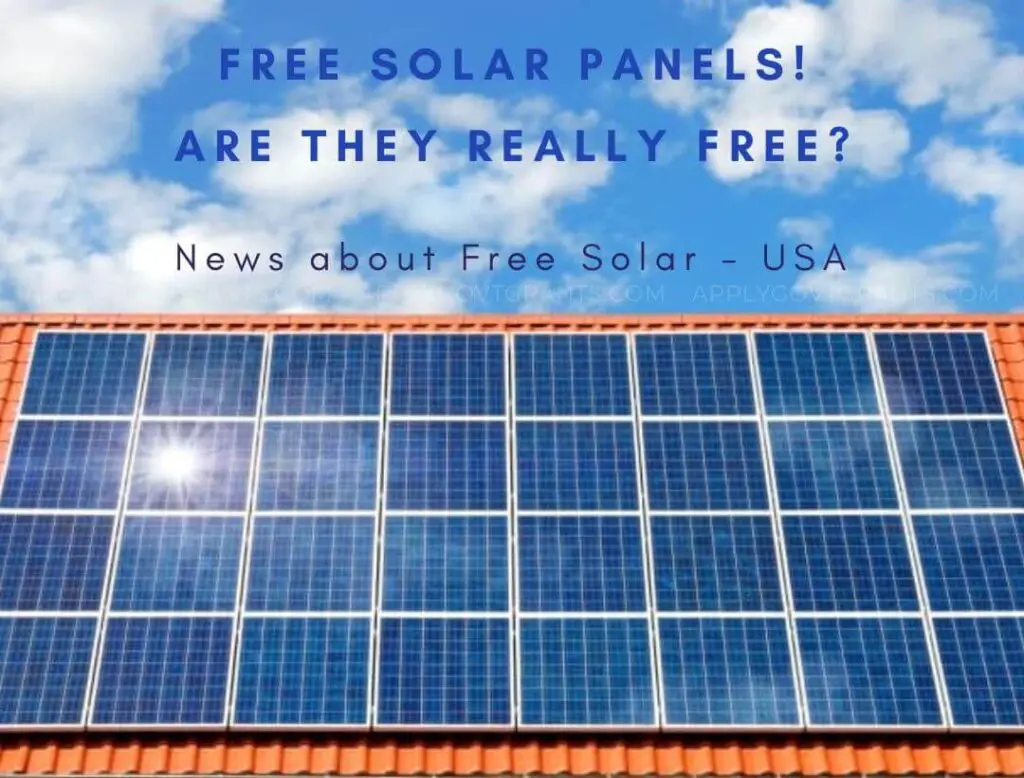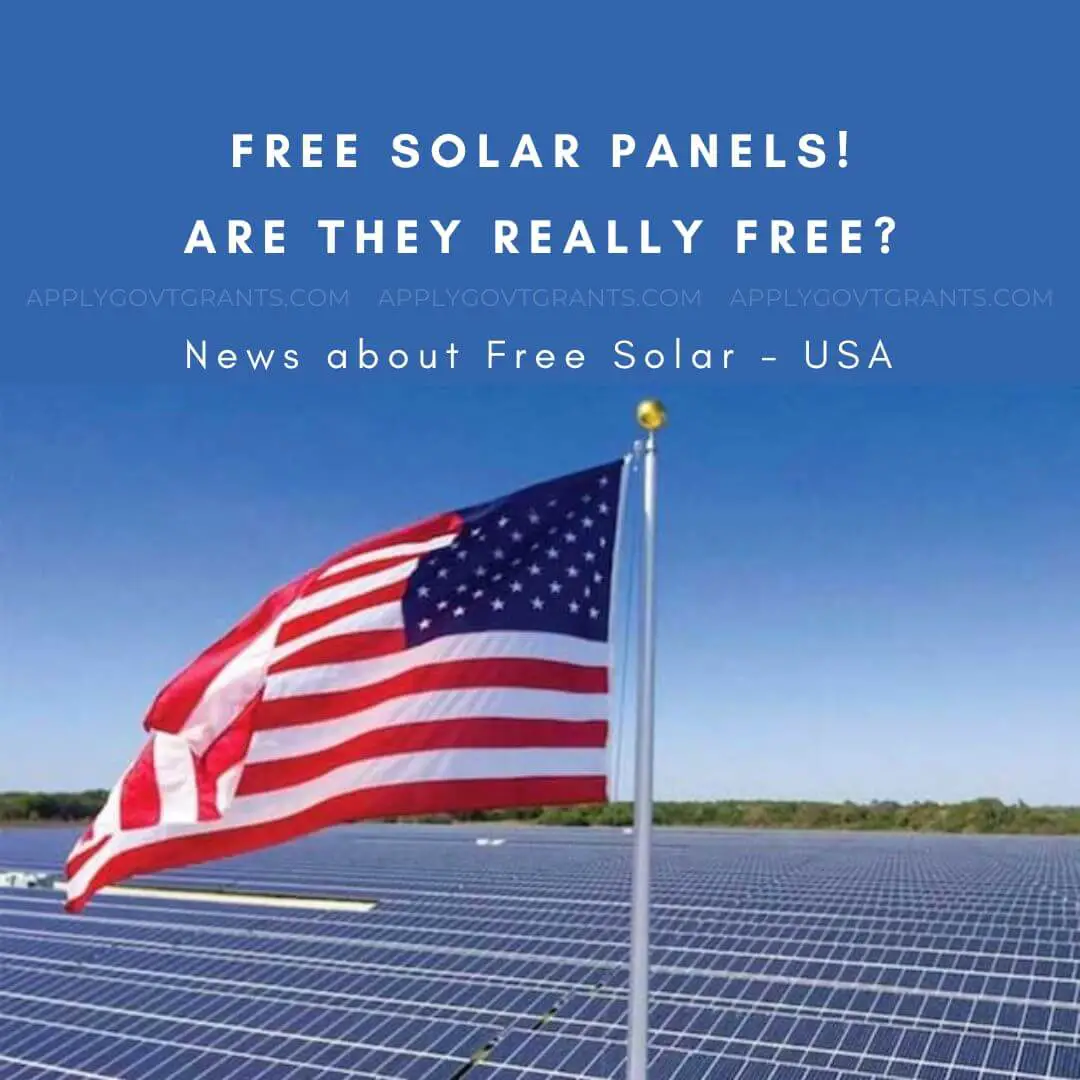Lets discuss about the free solar panels, how you aply for it. Have you ever encountered an inquiry from a business or a service company eagerly willing to install solar energy systems at your home without charging you anything, sometimes FREE?
Question arises in mind – Do things actually come for free, these days?
Let’s help you – what do businesses mean when they promise to provide you with free solar panels?
Advertising for solar leases or solar power purchase agreements may utilize phrases like “Free solar panels” or “No cost solar program” (PPAs 1). Knowing that the corporation will charge you for the electricity they produce from these installations – is all you need to do, when the company proposes any of these phrases to you. Therefore, it is a good idea to plan and make sure to think about financing them with a zero-down solar loan before contemplating the program.
So, is there a method to receive government-funded solar panels for nothing?
Sorry, the answer is No. In actuality you do not receive free solar panels from the government. You’re required to pay for them by the government. You must bear in mind that these payments—the solar lease—are free upfront options, so you actually pay for the electricity the system generates and miss out on all the financial advantages and even the tax incentives of renewable energy.
Therefore, the following post will cover all the facts you’ll need to know when thinking about putting solar panels in your home.
Check Also: How to get goverment Assistance for elderly?
So, What exactly does the government offer?

How can you go with a solar installation (lease) that requires less money up front?
When seeking for free solar panels or solar panels with a lower upfront cost, solar leases may be a suitable alternative for you to consider. The financial benefit should be your primary consideration when deciding whether to install solar panels or not!
If you analyze and compare solar to other industries, the solar business also seeks to maximize profits. By giving you solar leases at a typically lower price than what you pay for your utility, they give you access to solar power. Well, there are huge corporations like SolarCity that once dominated the solar lease market, but since they are no longer around, you can choose based on the deal the company makes to you.
Check Also: How to get free air conditioner from the government 2023?
Loans for solar energy?
The best part about solar lease is that anyone can get one, no matter how much money they have in the bank. It’s not like only the rich can have them. However, in modern times, solar loans have blended the “zero-down” element of solar lease with the advantages of system ownership, offering the best of both worlds.
What distinguishes solar buying alternatives involving cash purchases from those using loans and leases?
- Cash purchase: Considering moving through with a rooftop solar panel is undoubtedly a fantastic alternative; even if the cost may be high initially, the benefits you’ll enjoy over time cannot be compared to what you’ll spend initially. Benefits and savings in terms of money include tax credits, incentives, and many other things.
- Personal loan: When it comes to returns on investments, you might also apply for solar loans. The payback period in this instance, however, is dependent on a number of variables, including the upfront cost, size, energy efficiency, and interest rates related to the solar photovoltaic system that you’re going to buy. You get to keep 100% of the energy savings after your term is over.
- Solar leases and PPAs: Although you may want to rethink your decision to proceed with a solar lease or even a solar PPA, you must consider both sides of the issue. Therefore, you must remember that while purchasing these, there is no upfront cost, but you must consider the cut the solar company takes from your payment.
What is the best way to pay for solar panels? There are factors to take into account while choosing between solar leases and solar PPAs.
- Cash payment: When you buy a solar system, you essentially pay for around 25 years’ worth of electricity at a reduced rate all at once, isn’t that right? If so, buying cash will enable you to estimate your home energy expenditures decades in advance. You can also avoid fees, rate increases for utilities, and interest rates by doing this.
- Solar loan financing: We recognize that not all households will be able to afford to pay $15,000 or more up front. With solar loans, you may borrow money to pay for your solar system and then pay it back over time with the energy you save.
- Solar PPA: You already know that whether leasing solar panels or signing a power purchase agreement (PPA), the company wants you to pay a set sum each month for the solar power the panels actually generate. As a result, the solar firm you lease from will continue to own the panels, allowing it to benefit from the solar tax credit.
The sole distinction between the two is that with solar leases, monthly payments are required in order to utilize the solar energy system, whereas with PPAs, power generated by the panels must be purchased.
Frequently asked questions
Are solar panels really free of cost?
There is no such thing as a free solar scheme, unfortunately. These initiatives are really solar leases or power purchase agreements (PPAs), in which a business would install solar panels on your roof without charging you a deposit but will instead bill you for the electricity generated.
So, the answer is no, you cannot receive solar panels for free. But it is feasible to finance solar installation with no down payment, whether through a solar lease, PPA, or solar loan.
How can I purchase solar panels with no down payment?
You have a few options for putting down money, including solar leases, PPAs, and loans, as described before. You must decide which option best fits your financial situation. You must remember that system ownership qualifies you for important financial incentives that shorten the time it takes for your solar system to pay for itself and reduce the cost of solar. All of these consist of:
- A federal tax credit (ITC) worth 30 percent of the cost of the installation and equipment
- Exemptions from local sales and property taxes
- Rebates for solar energy from the government or utilities
- Net metering
- States that qualify for solar renewable energy credits (SRECs)
Who is eligible for the free solar panels?
Many people today, especially those from low-income neighborhoods, appear to have taken advantage of the claims made by solar panel manufacturers and proceeded with the purchase. This is why switching to solar is quite simple for practically everyone with a roof over their head, regardless of whether they can pay the installation fees up front or not.
Does purchasing solar increase my property value?
Using their own internal $0 down financing solutions, businesses like Blue Raven Solar have successfully marketed solar leases to clients who still enjoy the advantages of system ownership. SunPower, Trinity Solar, and Freedom Forever are some of the favorite firms among the people, providing you with solar panels, so check them out if you’re still not convinced.
What Are Legitimate Solar Panel Financing Options?
The marketing tactics that promise “free solar panels” are intended to draw buyers in, but for many homes, solar leases and PPAs end up being unfeasible options. Solar companies have even been sued in certain extreme situations for misleadingly offering “free solar panels” to unwary clients who lost thousands by entering into deceptive contracts.
So, here are some of the several solar financing choices you might want to think about:
- Reduce your initial expenditure with local and federal solar subsidies.
- Tax credits for solar energy and other government incentives
- Rewards based on performance
- Local and state incentives
Conclusion
‘Free Solar’ this terminology itself can be deceptive. Seeing that you’ve reached the end of the article, we hope you have a good idea now to understand that solar leases and PPAs are in no way “free” as the term states. Here, you don’t own the panels, and even though you don’t pay for the installation itself, you’ll eventually start paying two energy suppliers, your local utility and your solar firm respectively.
*1-PPA is Power Purchase Agreement.
